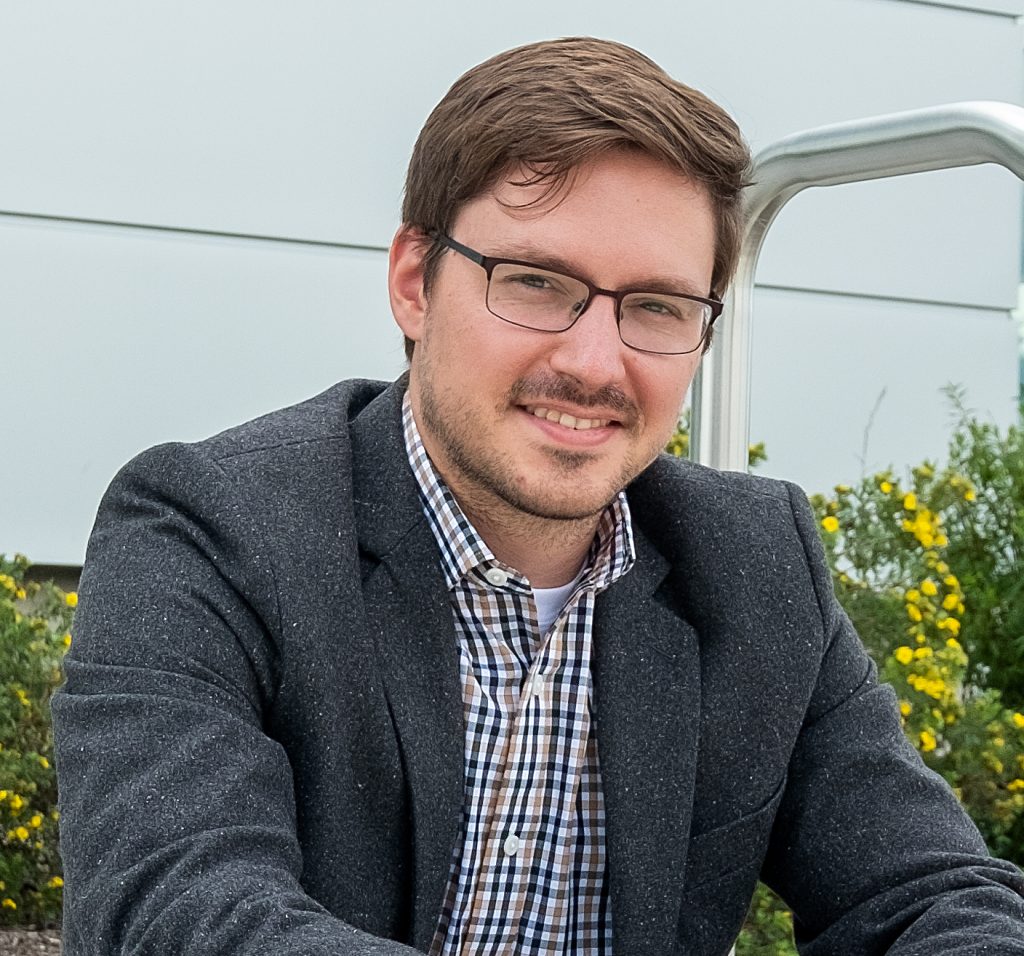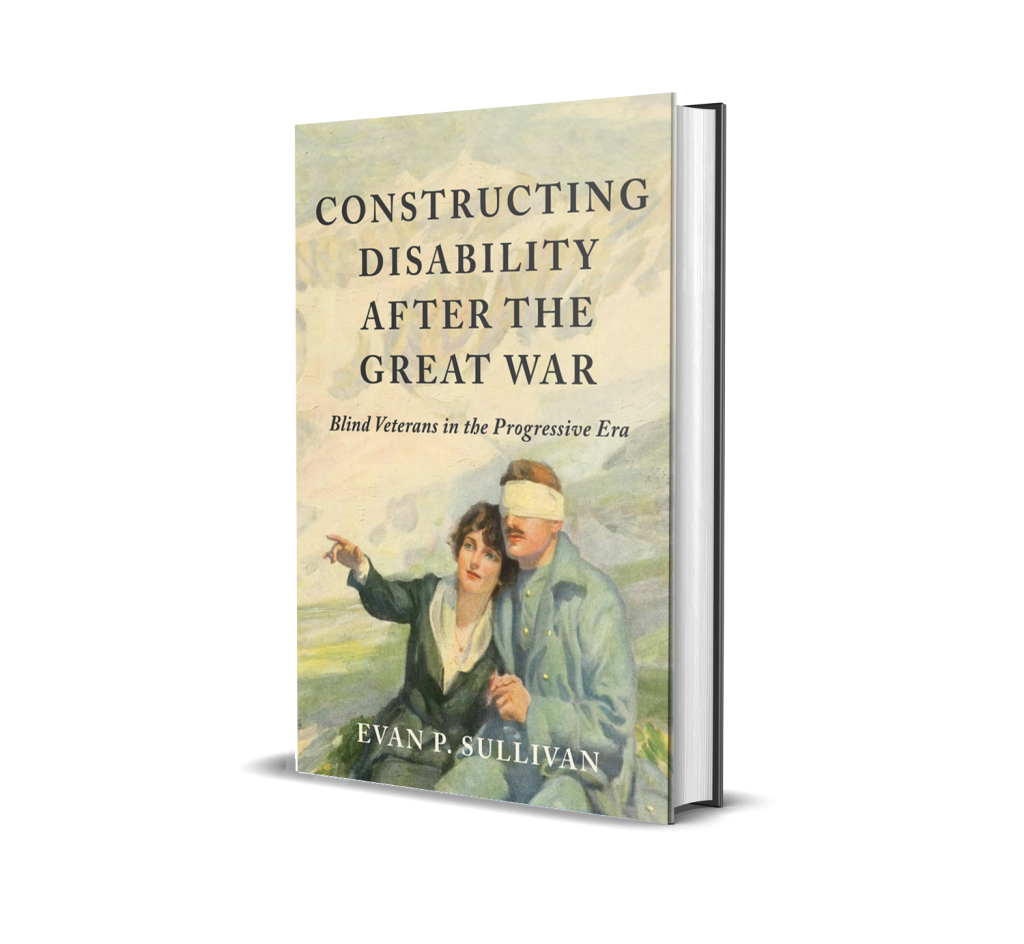Evan P. Sullivan, author of Constructing Disability after the Great War: Blind Veterans in the Progressive Era, answers questions on his new book.
Q: Why did you decide to write this book?
This book started as a PhD dissertation when I happened to come across information about a World War I rehabilitation hospital for blind French soldiers as I was looking through the diary of the New York State Education Commissioner. The Commissioner, John Finley, was interested in studying French education policies during the war and he visited the aforementioned hospital during his trip to France. The small reference to that hospital sent me on a search for answers to what it was like being a blind veteran in the interwar years. I was particularly interested in exploring how American media coverage of blind American veterans’ lives matched or did not match their lived experiences, and how blind vets as well as American society more broadly understood war-related sensory disabilities in relation to concepts such as race, gender, sexuality, class, and citizenship.
Q: What is the most interesting discovery you made while researching and writing your book?
I think the most interesting discovery I made while researching and writing was the fact that blind American veterans splintered off into two separate veterans’ advocacy groups that did not share the same beliefs about what they needed and how they wanted to be portrayed in the public. I cover this story in the final chapter of the book. Some blind veterans, predominantly those who were less socio-economically secure due to many factors beyond their control, hoped to create a permanent home where they could live and work. Their fundraising and advocacy efforts centered around this goal, much to the frustration of other blind veterans who were socially and economically more secure for various reasons and who campaigned against the permanent home. What surprised me most about this story was how both groups of blind veterans used ableist tropes to justify their stances with regard to the permanent home debate.
Q: What myths do you hope your book will dispel or what do you hope your book will help readers unlearn?
I hope my book will help readers unlearn the assumption that blindness is an absolute category, a binary where one is either sighted or blind. Visual impairment is a spectrum. Blind veterans after World War I, much like visually-impaired people today, contend[ed] with a sighted public that often misunderstands this fact, expecting disabled people to think and act in certain ways that conform to ableist and ocularcentrist ideas. Examining the lived experiences of blind veterans in history is far more enriching and complex than just reading the media narratives written by sighted people about blind people, which were so often based on inspirational narratives that the blind individual overcame their disability by sheer individual will and determination – these kinds of narratives ignore the challenges, realities, opportunities, biases, privileges certain people have in their lives regardless of whether or not they are blind or disabled. Just as we avoid strict binaries when thinking about gender, we should also avoid binaries when thinking about disability.
I also hope the book will help readers understand the privileges awarded to certain groups of blind people over others, namely to veterans. Blind veterans entered the interwar years with elevated social capital by virtue of their status as war veterans, regardless of whether or not they served in combat or even left the United States. Numerous veterans that I studied while writing this book recognized their privilege and argued for a more egalitarian conception of disability rights that went beyond providing benefits to disabled veterans. A few vets envisioned a more accessible world. We as Americans often shower gratitude on veterans by extending benefits that make it easier for them to live with disabilities in their communities, for good reason, but independent living and accessibility should be a human right for all rather than a privilege awarded to a few. This was a message that was clearly articulated by many blind World War I veterans.
Q: Which part of the publishing process did you find the most interesting?
The most interesting part by far was getting toward the end of the manuscript and recognizing the throughline arguments that tie the chapters together. It is challenging to have a bird’s eye view of your own project when you’re still exploring the records and writing chapters. Once you reach the stage where most of the project is completed, you come to understand the work in a whole new way that is exhilarating.
Q: What is your advice to scholars/authors who want to take on a similar project?
Try not to get overwhelmed. It can seem daunting at first to start a project and think of all the steps that need to be taken in order to complete the book. Keep the book as a goal, but also focus on the individual objectives that you can complete to get to that final goal.
Q: What do you like to read/watch/or listen to for fun?
For podcasts, I usually listen to Throughline and The Daily. I have also recently been listening to Long Shadow and Rumblestrip (really good if you have not yet checked it out). As a toddler dad, most of my viewing has been toddler shows, so I have been watching a lot of Daniel Tiger’s Neighborhood. And for books, I usually have a few going at any one time. Some of the recent books that I have enjoyed are David Hastings’s Odyssey of the Unknown Anzac and Andrew Leland’s book The Country of the Blind: A Memoir at the End of Sight.

Evan P. Sullivan is an assistant professor of history at SUNY Adirondack.

